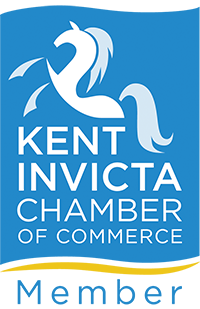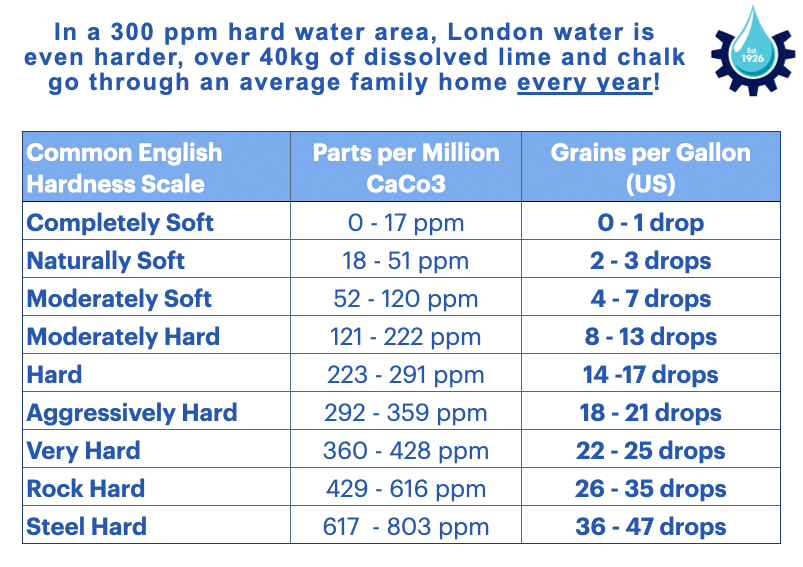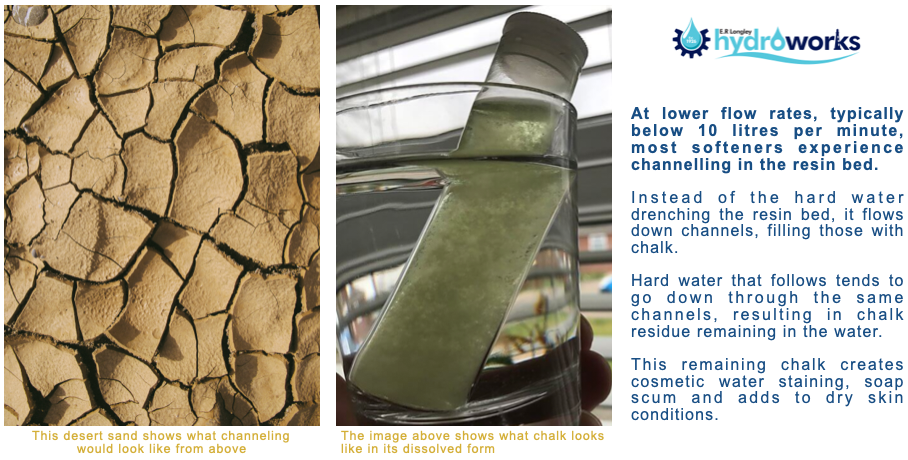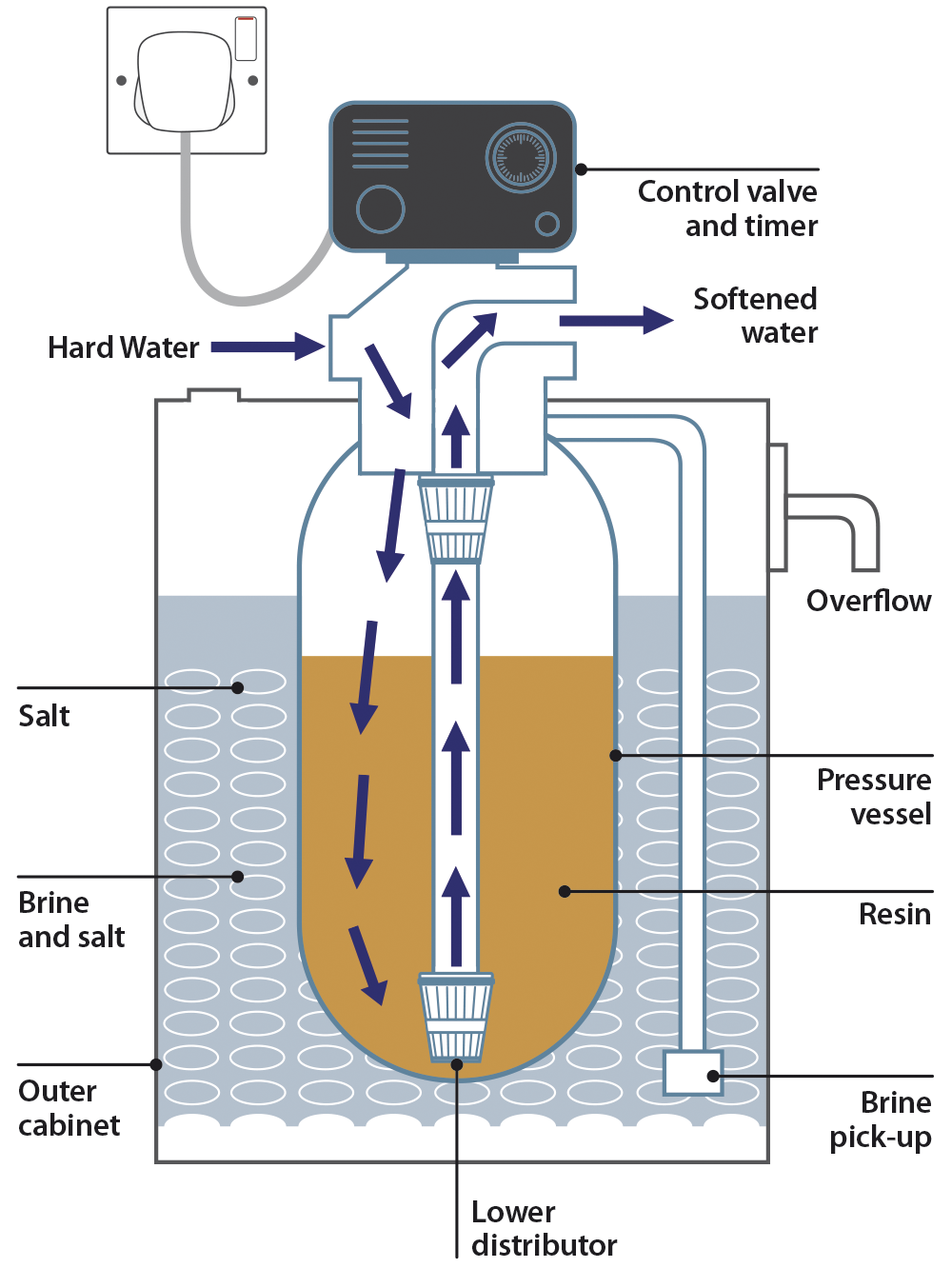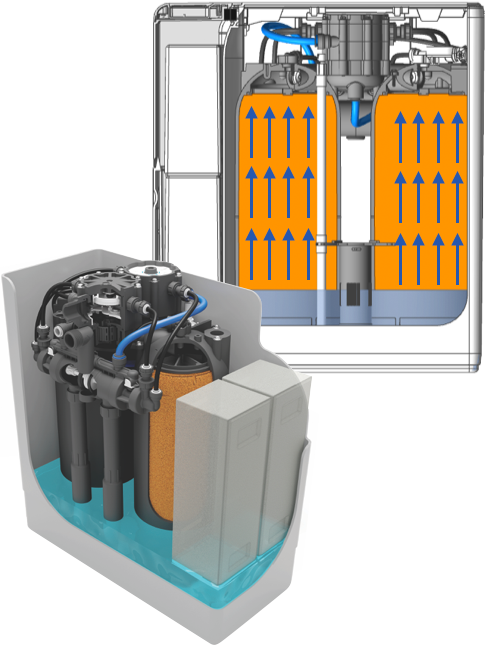How We Choose the Right Softener For You
Making the Right Choice for Decades of Soft Water
After more than 25 years in the UK water-softening industry, I’ve seen first-hand how much difference the right softener makes. Choose carefully and you can enjoy decades of beautifully soft water — without constant replacements or regrets.
Choose Well – Invest Once, Benefit for Decades
A quality domestic softener should be a “buy once” decision. When it’s chosen and installed properly, 20–30 years of reliable performance is completely realistic — and in some cases even longer.
Cutting Through the Marketing Noise
Unfortunately, our sector isn’t always clear. Slick marketing can make almost any product look good, but it often hides what really matters: consistency, running costs, reliability, lifespan, and after-care support. Many manufacturers and resellers focus on shifting boxes rather than long-term performance, regardless of the longer-term impact on the consumer. To many of them, it's all about immediate profit.
Our Independent Perspective - Why We're Different
At Hydroworks, we’re not tied to any one manufacturer.
Hydroworks is completely independent. We maintain and service every make and model of softener for more than 18,000 customers, so our guidance is based on real-world evidence, not sales targets.
Our role is to help you ask the right questions and choose a system that truly fits your home and water supply — not just for today, but for decades to come.
Our 4 Litmus Tests – How We Evaluate Every Softener
Over the 9 years I have owned Hydroworks, I’ve developed four simple “litmus tests” that every water softener should pass before we recommend it to a customer. They cover the things that really matter: performance, reliability, running costs and manufacturer support.
Quick snapshot:
1️⃣ PRODUCT RELIABILITY - BUILT TO LAST, NOT JUST TO SELL
Built to last, with a proven track record of performance over many years.
2️⃣ PRODUCT RUNNING COSTS: EFFICIENCY, SERVICING COSTS AND LENGTH OF LIFE
Low salt and water usage and low servicing frequency for economical running costs and minimal waste.
3️⃣ CONSISTENTLY HIGH-QUALITY WATER - THE HOLY GRAIL OF SOFTENED WATER
Delivers fully softened water at all flow rates — no blending, no surprises.
4️⃣ EXCELLENT TECHNICAL BACKUP
Long-term support, spares and servicing from a supplier who will still be there when you need them.
Click here to see our full 4-point Litmus Tests in more detail. (link pending - section further down this page)
The Truth About “Soft Water” – Not All Softness Is the Same
Water isn’t simply “hard” or “soft” — there’s a whole spectrum in between. What many companies call “soft” can still leave cosmetic water marks, soap scum and even traces of chalk in your water. Manufacturers and resellers alike never mention the difference between soft water and completely soft water.
Manufacturers and resellers rarely mention the difference between soft water and completely soft water. There are two main reasons. First, most machines struggle to measure and control flow rates below 10 litres per minute — and even those that can do so with varying degrees of accuracy. Second, many resellers simply don’t understand the problem well enough to explain it.
The result is often blended water: in homes with storage (gravity or unvented systems) and even in combination-boiler homes, the softness you get at any moment depends on how well the softener is working at the time you test it. It may feel soft but still leave marks on sanitaryware or traces of chalk that can aggravate dry-skin conditions.
A Real-World Example (Video Below)
The customer in the video below chose their softener exceptionally well. They originally purchased it in 1976 — the equivalent of about £9,000 in today’s money. When we were invited to carry out a free health check over 40 years later, the machine was still producing softened water, although its time clock was failing.
Knowing that modern softeners are far more efficient, and wanting the convenience of lighter block salt with ongoing reliability, the customer decided to upgrade. We installed a Harvey Minimax M3 water softener — at the time the most advanced non-electric model on the market (Harvey has since launched the next-generation Minimax Innova). Their running costs dropped from £175 a year to just £53.
(Watch the short video below to hear their story.)
✔ In my professional opinion, a properly specified water softener should give you completely soft water - ALL of the time.
This is a factor that I think is even sadly misunderstood by the vast majority of our own sector!
- - - - - - - - - - - - - - - - - - - - - - - - - - - - - - -
The Best Softener for Your Home – How We Help You Decide
The only proven way to remove chalk, prevent scaling, keep your sanitaryware sparkling and help protect your skin from hard water (including eczema) is with a salt-based water softener.
Devices sold as “salt-free softeners,” magnetic or electrolytic conditioners, or “structured water” systems simply don’t do the job. They’re marketed to make a profit, not to give you true soft water. Please don’t fall for that misleading advice.
Let me share a story with you...
I used to look after a dealer back in my EcoWater days when I was running the UK dealer network for the biggest manufacturer of softeners in the world.
This particular company sold not only softeners, but also powerful magnetic scale reducers, which they told customers were better than softeners. That story stayed like that for years until, one day, they started manufacturing softeners.
Overnight, their sales message changed, and they then started saying that some treatment could be achieved by magnetic devices, but the real answer was softening. I found it astonishing that the marketing message took a 180° turnaround when business direction changed.
I know many in our sector feel that the industry is full of smoke and mirrors, creating deliberate confusion for the customer!
❓ Did you know that the salt never goes near the drinking water supply, it is purely used to remove the chalk that has been captured from the water supply, and chuck it down the drain via a brine water solution, after which fresh water is used to flush the bed of resin and make the softened water delicious and safe to drink!
- - - - - - - - - - - - - - - - - - - - - - - - - - - - - - -
The Power of True Independence – Putting Customers First
When I bought Hydroworks, I quickly realised that the previous owner, Jeremy, had agreements with suppliers that came with sales targets. The closer we got to those targets, the more pressure there was to recommend certain products - and not necessarily the best ones for the customer either!
That didn’t sit right with me, and I felt rubbish being led by someone else for all the wrong reasons!
About six months in, I decided to take a stand. I asked our suppliers to cancel all contracts so that I could be completely independent. Some agreed - but many didn’t. In fact, some manufacturers cut off our access to their products entirely.
By month nine, Hydroworks was truly independent - but it came at a cost. Our overheads went up, and some suppliers treated us like outcasts. But the response from customers? Incredible. They loved that we weren’t tied to any brand and could genuinely recommend what was best for them - even if it sometimes made us more expensive.
Fast forward to today, and those same suppliers who once shut us out are now welcoming us back. Ironically, some of the companies that refused to work with us no longer exist.
Being independent means I choose the right product for the customer - not based on targets, but on my unique and extensive experience. Many water softeners look great on paper, but the reality is that some are designed to sell well, but not perform well. At Hydroworks, we only stock what truly works - no marketing gimmicks, no brand bias, just the right solution for your home!
- - - - - - - - - - - - - - - - - - - - - - - - - - - - - - -
The Hydroworks Litmus Test – How We Choose our Products
When it comes to water softeners, not all products are created equal. To ensure we only offer the best to our customers, I developed the Hydroworks Product Suitability Test - a four-step process that every product and supplier must pass before earning my endorsement.
I call this :
Our Hydroworks 4-point Litmus Test
1️⃣ PRODUCT RELIABILITY - BUILT TO LAST, NOT JUST TO SELL
Built to last, with a proven track record of performance over many years.
2️⃣ PRODUCT RUNNING COSTS: EFFICIENCY, SERVICING COSTS AND LENGTH OF LIFE
Low salt and water usage and low servicing frequency for economical running costs and minimal waste.
3️⃣ CONSISTENTLY HIGH-QUALITY WATER - THE HOLY GRAIL OF SOFTENED WATER
Delivers fully softened water at all flow rates — no blending, no surprises.
4️⃣ EXCELLENT TECHNICAL BACKUP
Long-term support, spares and servicing from a supplier who will still be there when you need them.
Below are each of those points in more detail:
✅ 1. Product Reliability – Built to Last, Not Just to Sell
If a water softener fails, it’s not just an inconvenience - it’s a frustration for the customer and a potential trust issue for us. That’s why reliability is non-negotiable in our selection process.
What makes a reliable softener?
• Proven longevity - a product should last decades, not just years.
• High-quality internal components - not just a fancy exterior.
• Minimal failure rates - we don’t deal with manufacturers that cut corners.
The Truth About Failure Rates:
Somewhere between 2003 and 2006, a Chinese export agent accidentally emailed an internal report that revealed that exported softeners to America and Europe had a 14% failure rate in the first year, yet they still deemed this “sustainable” because of high profit margins. At the time, American brands like EcoWater and Kinetico capitalised on this error by announcing their failure rates were under 6%, and Harvey Softeners were discussed within the sector at 11% at the time.
Common water softener failure causes:
• Poor build quality - cheap components that break easily.
• Electronic faults - especially in budget models.
• Resin failure due to chlorine contamination - one of the biggest failure causes worldwide.
• Incompatibility with UK plumbing - yes, even some UK-sold softeners aren’t appropriately designed for UK homes!
Bottom line? If a softener isn’t built for long-term performance, it doesn’t make our list!
- - - - - - - - - - - - - - - - - - - - - - - - - - - - - - -
✅ 2. Product Running Costs – What’s the Real Price Over Time?
This is such a massive consideration, so it was hard not to make this number 1 on the Litmus Test.
Salt and water usage
Some softeners use over 100L of water & 1.3kg of salt per regeneration, while others use as little as 36L of water & 450g of salt.
• More efficient models = lower running costs over time.
Do you want to spend a lot, or a little each year?
Annual Servicing – The Hidden Cost
This is a minefield! Manufacturers tend to state that if you don't service the machine in line with the recommended instructions, you will invalidate the warranty. And, depending on what is happening in the market place, they may say 'no servicing required' in the UK, but insist on annual servicing when selling in another market, such as the USA or France. Talk about smoke and mirror marketing!
Some manufacturers, particularly those that sell through plumbers and builders merchants, such as BWT, even make it impossible for a customer to go anywhere but to them for servicing, securing their customer base and increasing the cost of the service to the customer. They go further - they educate their customers into the habit of just paying for their annual service through a 'maintenance care plan’, and then when the softeners get older, they just get the customer to replace the machine within the ongoing maintenance plan!
While some softeners require annual servicing (which can become very costly over the life of the machine), interestingly, others state no servicing is required at all (saving a significant amount of money over the life of the machine).
OUR PHILOSOPHY? Truthfully, I get it from my mentor, Harvey, who had the best Long-Term Thinking.
When I worked for Harvey Softeners, I heard many complaints from dealers because Harvey stated no annual servicing was required. But I recall his reasoning almost word for word, even all these years later:
💡" If you spend all your time servicing the same 100 customers, in 10 years, your business won’t grow. But if you sell quality machines that don’t need constant servicing, you can focus on helping more people and growing the market. That’s how you build a sustainable business".
I'm sure you can see why I fully subscribe to Harvey's way of thinking!
Length of Life – The Best Investment Lasts Decades
A water softener isn’t something you should have to replace every few years - it’s an investment that should last decades. But not all softeners are built for the long haul.
Typical Lifespans:
• Low-end models – 3 to 8 years (if you’re lucky)
• Mid-range models – 5 to 13 years (better, but still not ideal)
• High-quality softeners – 15 to 30+ years (and some go much longer!)
The longer a softener lasts, the better your return on investment. If you buy cheap, you’ll probably end up replacing it sooner, and in the long run, you’ll spend more.
Our Approach? We only recommend softeners that are built to last, with proven longevity and spare parts available for long-term servicing.
- - - - - - - - - - - - - - - - - - - - - - - - - - - - - - -
✅ 3. Consistently High-Quality Water - The Holy Grail of Softened Water
⚠️ The Truth About Water Quality - Why Consistency Matters
This is arguably one of my most important Product Suitability Tests, I feel.
If you have a boiling water tap that doesn’t supply boiling water to 100°C, then you won't get the very best cup of tea.
If you have a water softener that can only soften the water within the range of soft, and therefore still leave chalk in the water, then softened water is not going to be as pleasurable to bathe in, and it's going to leave cosmetic water staining on fixtures and fittings as you'll see in the shower photographs a little bit further down.
More importantly, if you have dry skin conditions in the family, they are not going to be helped if there is still chalk in the water blocking the pores of the skin. Hard water is even linked to acne because once again, dissolved chalk blocks the pores of the skin!
Advertising Standards and their requirements on our industry
Water Softeners in the UK have to comply with Advertising Standards and do what they say on the box, and that is that they just need to produce water that is soft, 'soft water', which on the scale of hardness (see the hard water table in the section below), equates to anything that is 120 ppm of hardness (or 7 drops of hardness), or below.
Many softeners, over time, might average 5-7 drops on the scale of softness, particularly where water is stored in the property, or water usage is lower.
The problem with that statement is that manufacturers are slow to tell customers that most softeners struggle to measure flow rates below 10LPM (litres per minute), and they don’t put this in their sales documents, but the clever ones do put it into their service documents as a get-out clause for those circumstances where a customer complains that they are not getting completely soft water. Customers don't buy water softeners thinking that they won't get completely soft water; they just expect it, understandably.
Below is one such instance:
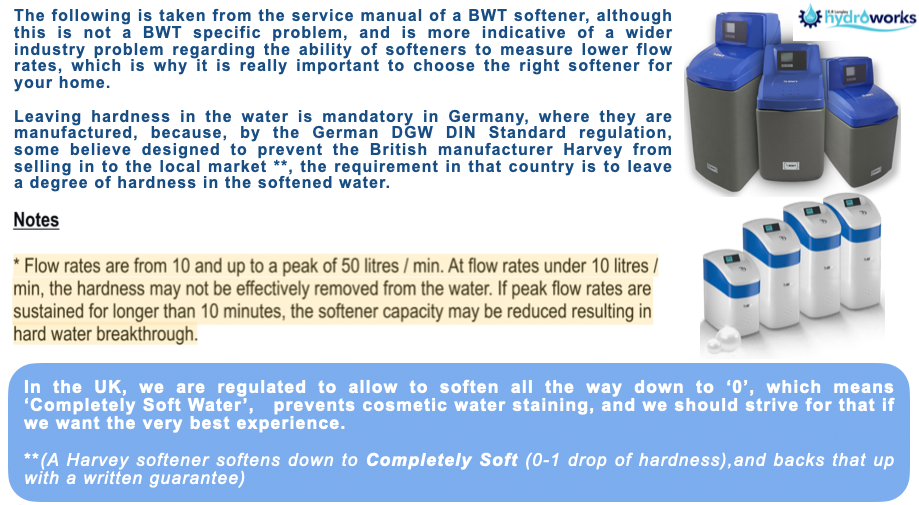
In naturally soft water areas (like where I live in Haywards Heath) that fall into the scale of soft - customers still purchase water softeners, not because of scaling, but because of the cosmetic effects and dry skin conditions commonly found in harder water areas.
If they purchased a softener that could only average 5-7 drops of softness over time due to 'channelling' or 'trickle flow', then they won't get much benefit from their water softener. So the best answer is to get something that does between 0 and 3 drops, unfailingly.
What do I mean?
Well, most of the water we use in our home is below that 10LPM threshold;
- a dishwasher and washing machine might fill at about 1.5-3LPM depending on the model
- an electric shower might flow at about 5-7LPM
- a loft tank system and often even a unvented hot water tank will top up between 0.3-2.3LPM
- The only time where we may get above 10LPM is where a powerful power shower is in use, or we are running a bath.
So much of the water we use in our home can indeed be below 10LPM.
At lower flow rates, ‘channelling’ within the resin occurs, which means that the chalk fills a channel of the resin bed, and the next hard water that comes behind tends to find the easiest route through the bed, and if that is already full of captured chalk, then the water that comes out the other side through the taps will have chalk in them.
And this leads us directly into ‘trickle flow’. That is the next big problem most softeners have. They have off-the-shelf standard paddle metres that can’t measure low flow, and at very low flow rates the metres simply stop doing their job. The result is that the softener electronics or gearing will think that the softener still has the capacity to soften the water, but the reality is that the cylinder is full of chalk and the customer is getting hard water.
Below are some shower photos from a customer who’s softener was working perfectly, but look at the hard water staining! What a story this one was - I must do a case study of it! They simply had the wrong machine for their home. Sadly, they thought all water softeners were therefore not very effective, and were planning to go back to hard water when their machine eventually broke down. Luckily we were able to help them out, and give them completely soft water with the right machine for their home.
I often feel many in our industry don't have a deep understanding of the sheer importance of water quality, and the impact of channelling and trickle flow.
- So the consistency of softened water is the holy grail of our sector, in my view!
- - - - - - - - - - - - - - - - - - - - - - - - - - - - - - -
✅ 4. Manufacturer Backup
Getting good back-up from manufacturers when it's needed in our sector can sometimes feel like pulling teeth - difficult and painful.
This is a tremendous shame because sometimes a product is good, but when it goes wrong, and support is needed, if the customer can't get the support they need, they understandably lose faith and have every right to become annoyed.
And so, we only ever recommend products where the manufacturers give excellent support. Our customers need to know that they are supported if things go wrong.
If a supplier becomes tardy and doesn’t give good customer support, then that will inevitably impact our willingness to recommend their products, even if the product is great! There is no value in having a fantastic product you can’t get good support for when you need it.
- - - - - - - - - - - - - - - - - - - - - - - - - - - - - - -
Important Considertions
✅ Do you need a single-cylinder or twin-tank water softener?
Single-cylinder water softener
Not all softeners are the same. A single-cylinder softener can only do one thing at a time — either soften the water or regenerate its resin. While it regenerates, it’s supplying hard water to the house.
Most (though not all) single-cylinder models also struggle to accurately measure flow rates below 10 litres per minute — yet the majority of domestic water use happens at these lower flow rates.
Some manufacturers even build to the German DIN standard, which deliberately leaves hardness in the water supply. That may suit German homes (where there’s no choice), but it’s far from ideal for British homes, which can have completely soft water.
When a single-cylinder softener is installed in the wrong type of home, the result is often cosmetic water marks and staining on taps and shower screens, plus “blended” water with 50–120 ppm of hardness still remaining.
Twin-cylinder water softener
A twin-cylinder water softener delivers softened water all the time — even while one cylinder is regenerating. But not all twin-cylinder designs perform equally well.
Some models, such as the American Kinetico, operate on a “flip-flop” system where only one cylinder works at a time. This forces customers to choose between a unit with high flow rates but higher running costs, or one with better efficiency but reduced flow rates.
By contrast, the British-made Harvey Minimax uses both cylinders simultaneously, guaranteeing consistently softer water without compromise. It combines high flow rates and high efficiency in one model, which is why it’s now the biggest-selling softener across the UK and Europe.
The Minimax also incorporates the same Elster water meter used by UK water authorities in their official household meters. Because water authorities don’t give water away, these meters are designed to measure virtually every drop with exceptional accuracy — and that’s the precision built into your Minimax.
- - - - - - - - - - - - - - - - - - - - - - - - - - - - - - -
✅ How efficient do you want your softener, and how soft do you want your water?
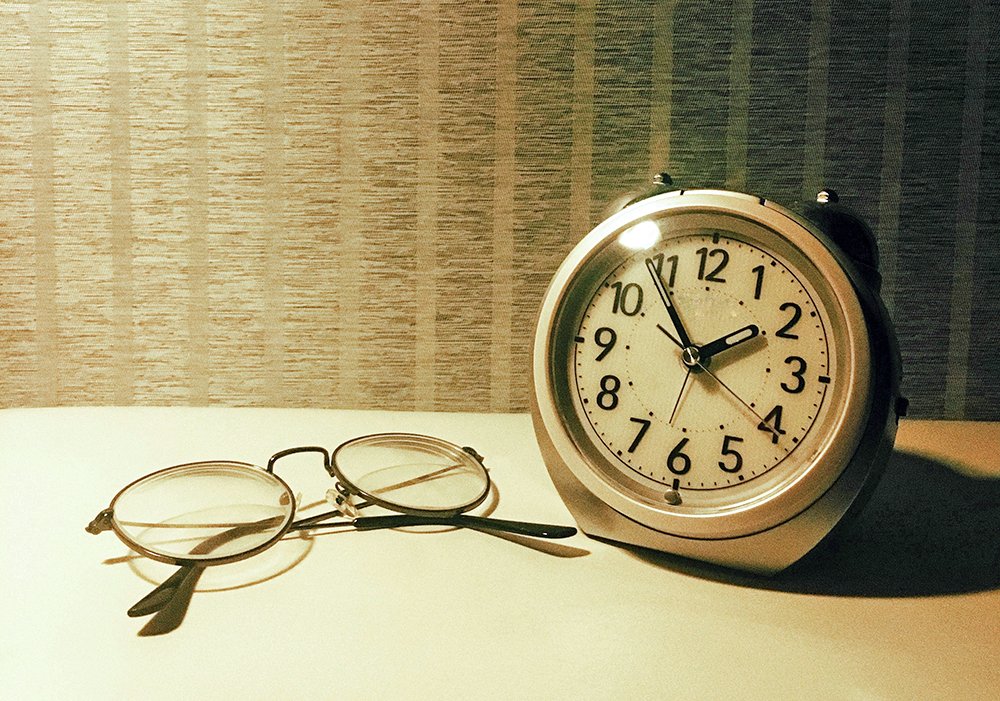
Timer Controlled
Old fashioned, cheaper and far less efficient.
Timer-controlled softeners regenerate at the same time every day whether they need to or not. This wastes salt and water, makes the unit work unnecessarily hard, and shortens its lifespan.
Even many metered, single-cylinder softeners still have an in-built manufacturer pre-set to regenerate every three or four days. This is meant to “refresh” the resin bed and prevent bacterial build-up — but it’s really a workaround for machines that struggle to measure flow rates accurately below 10 litres per minute.
The result: higher running costs, more maintenance, and a much shorter service life than a properly metered, demand-driven softener.
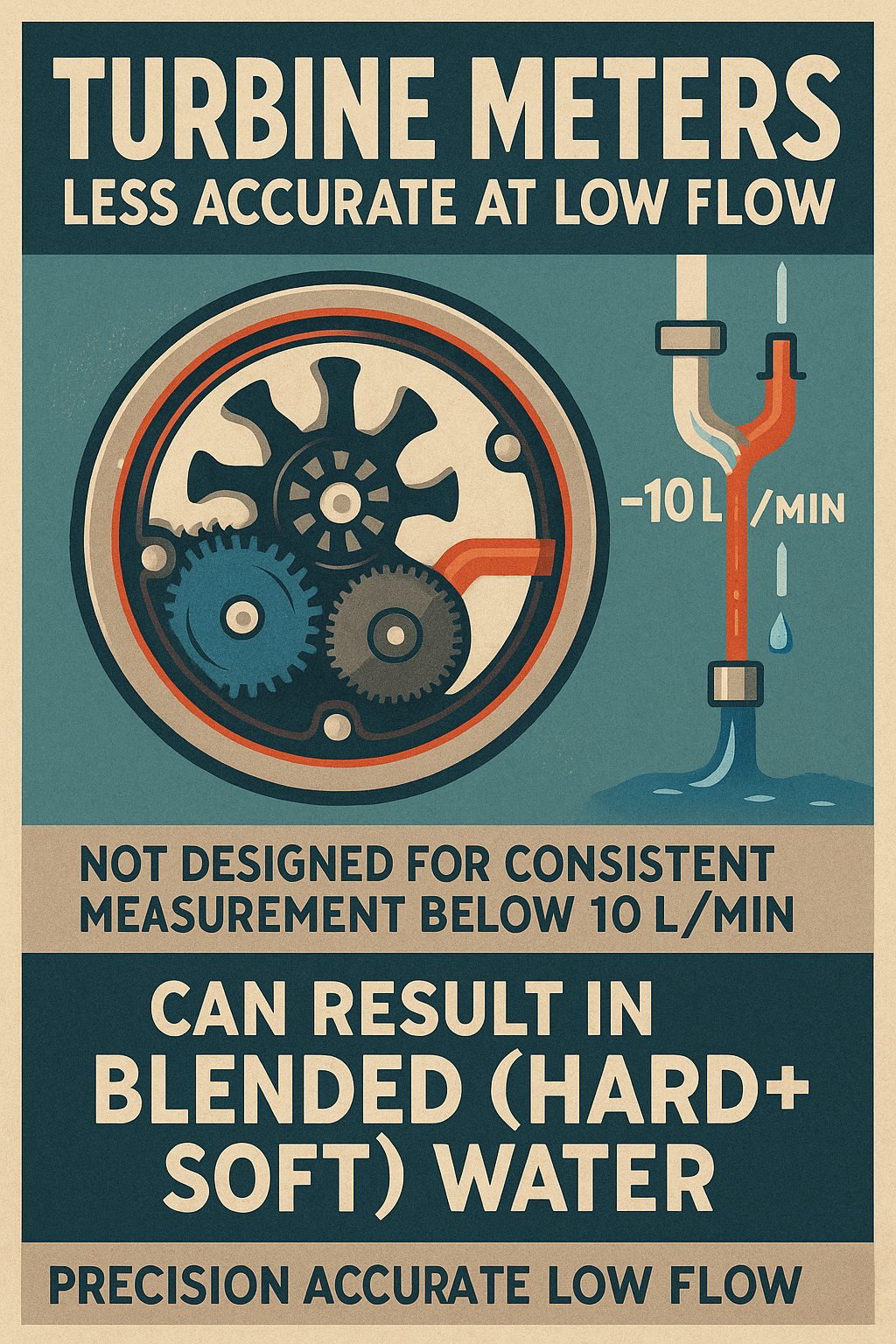
Turbine Meter
Almost all metered water softeners use a form of meter like this
Found in many single-cylinder softeners and even some twin-cylinder models such as Kinetico, the traditional “aeroplane propeller” style turbine meter is prone to letting hard water slip through. This “slippage” creates trickle-flow, leaving hardness in the water and causing cosmetic staining on taps and sanitaryware.
For example: A softener might be designed to regenerate after 500 litres of softened water. But at lower flow rates, the turbine meter may under-record usage and only trigger regeneration after 600–700 litres, allowing hard water to pass through long before the unit resets itself. This creates blended water in a stored water home or hard water in a combination boiler home.
Within the industry, the inaccuracy of turbine meters is well recognised. Best practice often means fitting additional treatment solutions in the home — particularly on loft-tank or gravity-fed systems — or increasing the frequency of regeneration by adjusting the time-clock or hardness setting.
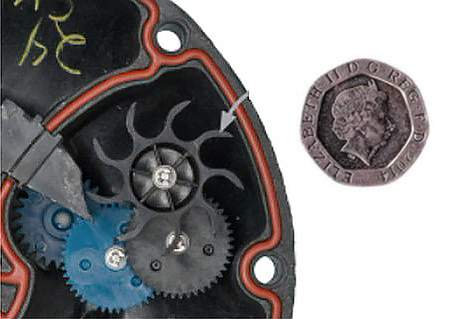
- - - - - - - - - - - - - - - -
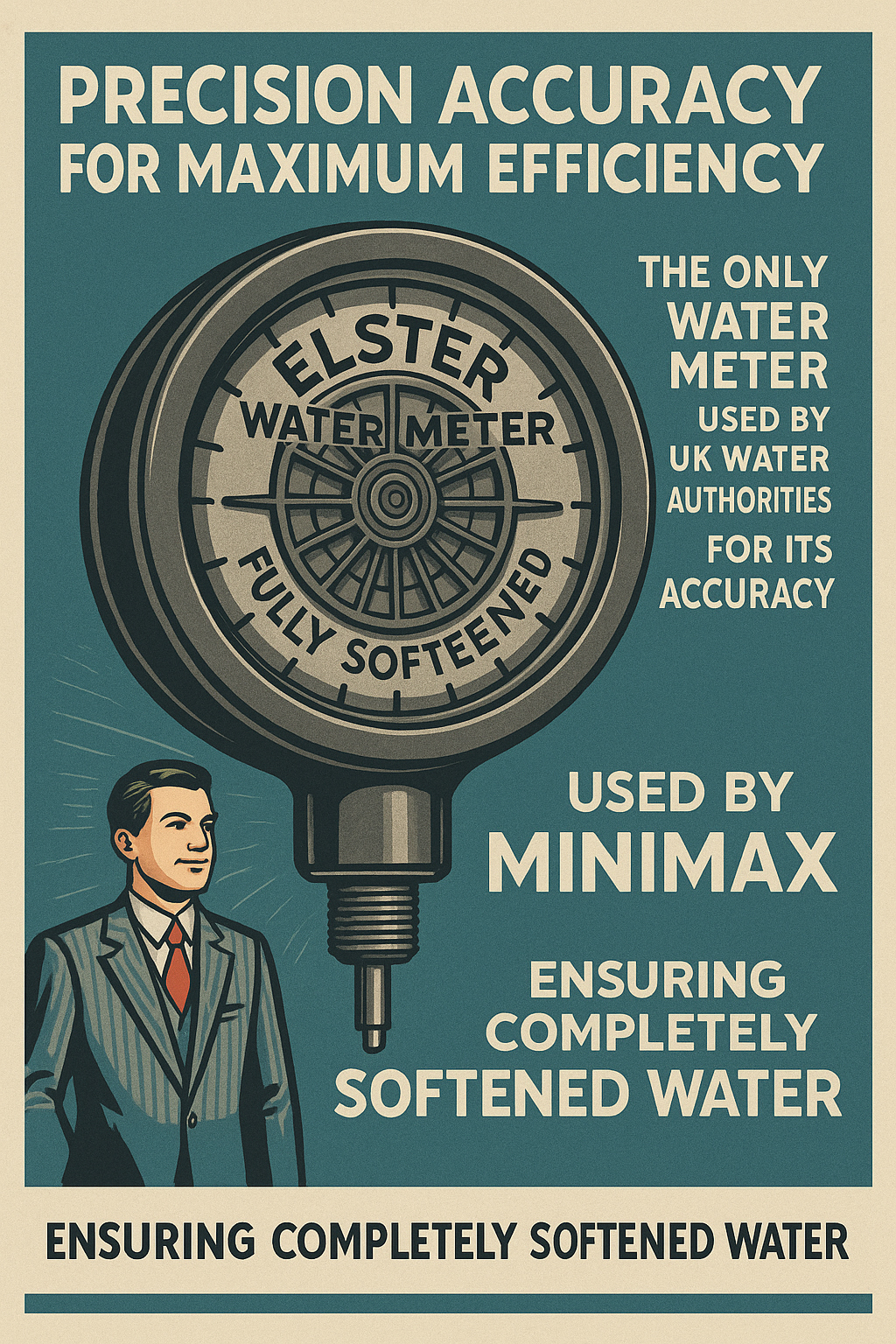
Elster Displacement Meter
The most advanced, totally accurate meter — even used by the UK water authorities.
In my professional experience, the better the softener, the better the meter.
Within the UK market, British manufacturer Harvey has designed its softeners to use the very same Elster water meter (sometimes called a Kent meter) that water authorities fit to household supplies. These meters are renowned for their precision: if you have a leak, your water board will bill you for every drop — because their meters measure every drop.
The same level of accuracy is built into the Harvey Minimax softeners. They record virtually every drop of water used in your home — even a slow dripping tap — regardless of your plumbing layout or water system. This precision allows the softener to deliver incredibly soft water all the time.
As a result, Harveys is the only manufacturer in the domestic sector to guarantee completely soft water at all times — to a maximum of just one drop of hardness. By comparison, most other manufacturers class anything up to seven drops as “soft” (with many traditional softeners operating at 5–8 drops), which is unfortunately still enough to leave significant cosmetic water staining from remaining chalk and hardness in the mains supply.
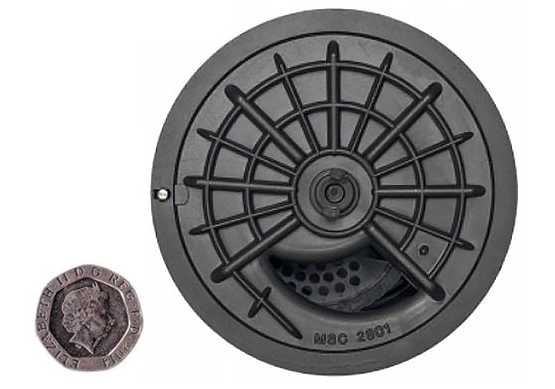
- - - - - - - - - - - - - - - - - - - - - - - - - - - - - - -
The Rinse & Repeat Trap – When Cheaper Softeners Cost You More
In recent years, the marketing machines behind cheaper Chinese water softeners have been in full force - often appearing in print media like the Daily Mail. Companies like EWT and Water2Buy built their success on selling lower-cost softeners wrapped in well-branded subscription plans for servicing and salt.
At first glance, it all seemed convenient and affordable. But for those who took the plunge, the writing was on the wall long before disaster struck. Over time, servicing became harder to access, spare parts became unavailable, and eventually, both businesses shut down. Customers with “guarantees” found out the hard way that a guarantee is only as good as the company standing behind it.
But here’s the real issue: This isn’t new. We’ve seen this happen in other industries—companies launch with cheap, attractive products, scale fast, and then collapse under the weight of poor quality and bad aftercare. Then, like clockwork, they reappear under a different name, doing the exact same thing all over again.
The phrase “rinse and repeat” comes to mind - except in this case, the only ones getting rinsed are the customers who regrettably trusted them.
- - - - - - - - - - - - - - - - - - - - - - - - - - - - - - -
The Three Main Types of Water Softeners Explained
There are three main categories of softeners, and knowing the difference can save you from costly mistakes:
1️⃣ Budget Models (3-8 Years Lifespan) – Cheaper upfront, but often built with plastic valves and no spare parts available. Always heavy on salt and water. Once it fails, it’s landfill.
2️⃣ Plumber/Builder Grade Models (5-13 Years Lifespan) – Reliable for a while, but often designed to be disposable. Repairs? Not always an option, and often only available from the manufacturer at a premium cost. Normally heavy on salt and water.
3️⃣ High-Quality Consumer Models (15-30+ Years Lifespan) – A long-term investment. Designed to be serviced, repaired, and to last decades when properly maintained.
✔ Moral of the story? If you buy cheap, unfortunately you’ll probably buy at least twice and spend more than you intend, on capital cost and definitely on running cost!
- - - - - - - - - - - - - - - - - - - - - - - - - - - - - - -
Why getting the specification right matters?
In my experience, the softer and more consistent the water, the happier the customer. The better their home sparkles, the healthier their skin feels, and the more delighted the whole family becomes. A well-chosen, salt-based softener should give you water so soft that showers and baths become genuine “wow” moments — and kitchens and bathrooms stay sparkling without harsh scrubbing or chemicals.
But this only happens if the softener is correctly specified for the property and the people who live there.
-
Property layout: Homes with three floors and a bathroom at the top often need a more powerful softener to maintain pressure and flow rates. A standard model may struggle, but the best machines can handle these installations well.
-
Family size: A large household can push a standard softener beyond its comfort zone, making it expensive to run and shortening its lifespan. Correct sizing avoids this “wearing out” effect.
Unlike boilers, contrary to popular belief, most water softeners shouldn’t be sized purely on property type. In the majority of homes, we should size by the number of people in the home for the most accurate match — although there are exceptions.
My team at Hydroworks offers a free home survey and completely independent advice to make sure your new softener is the perfect fit before you take the plunge and invest in softened water.
- - - - - - - - - - - - - - - - - - - - - - - - - - - - - - -
✅ Do you want to use tablet salt or block salt?
Before we talk which salt, we must talk the quality of salt. NEVER use sea salt or solar evaporated salt in a water softener - it will damage your softener permanently. You can read more here on our website.
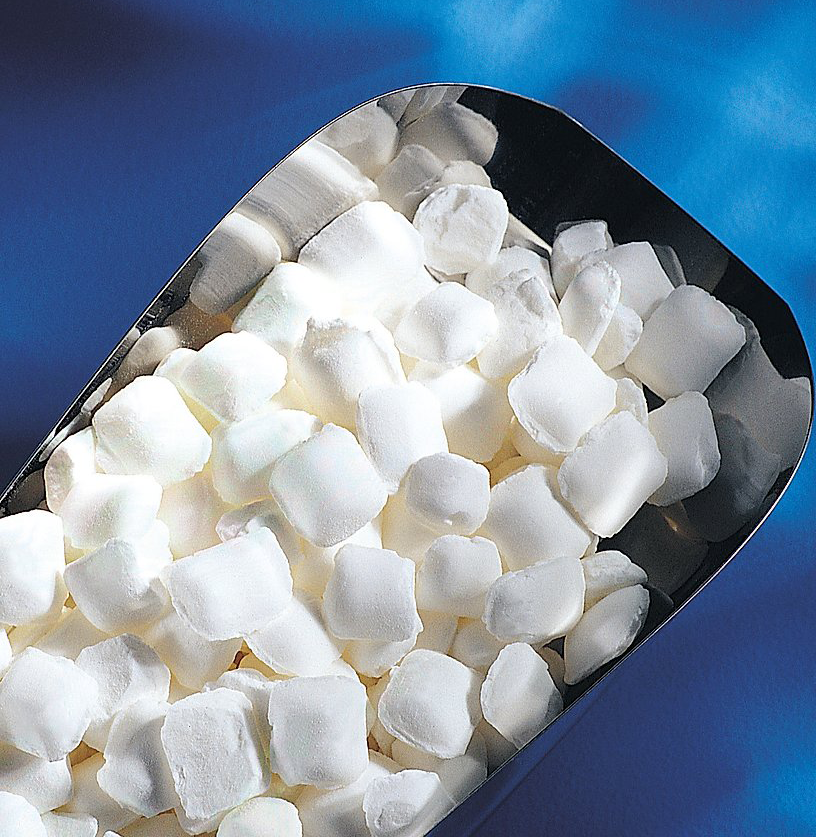
Tablet Salt
Tablet salt is better for a water softener than the older granular salt and comes in either 25kg bags or easier-to-handle 10kg bags.
Most tablet salt softeners are wildly inefficient, so we select only those softeners that are the most reliable, the most efficient and have the best performances.
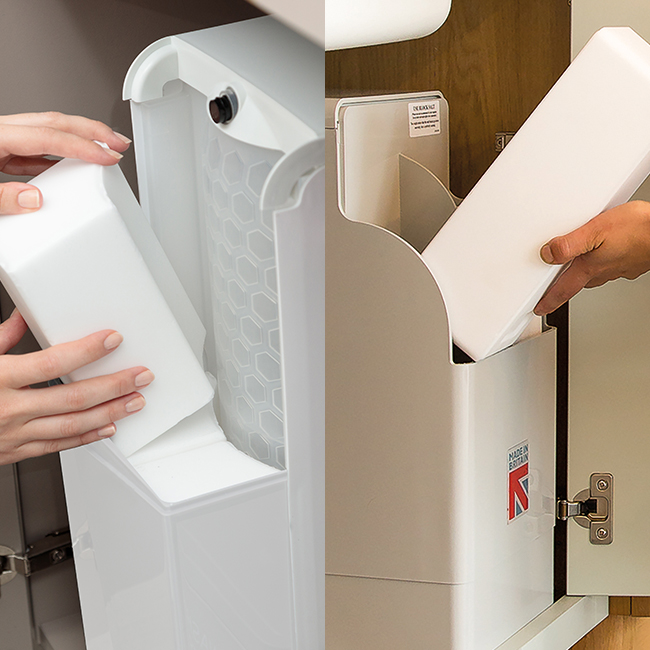
Block Salt
Block salt softeners aren't suitable for every home, but for those where they are, you will find the salt easy to handle and convenient.
Block Salt creates a very pure brine solution – this typically means the softener requires less servicing and less ongoing maintenance.
Block salt is typically a little more expensive than tablet salt, which is countered by the savings made because these machines need less servicing.




